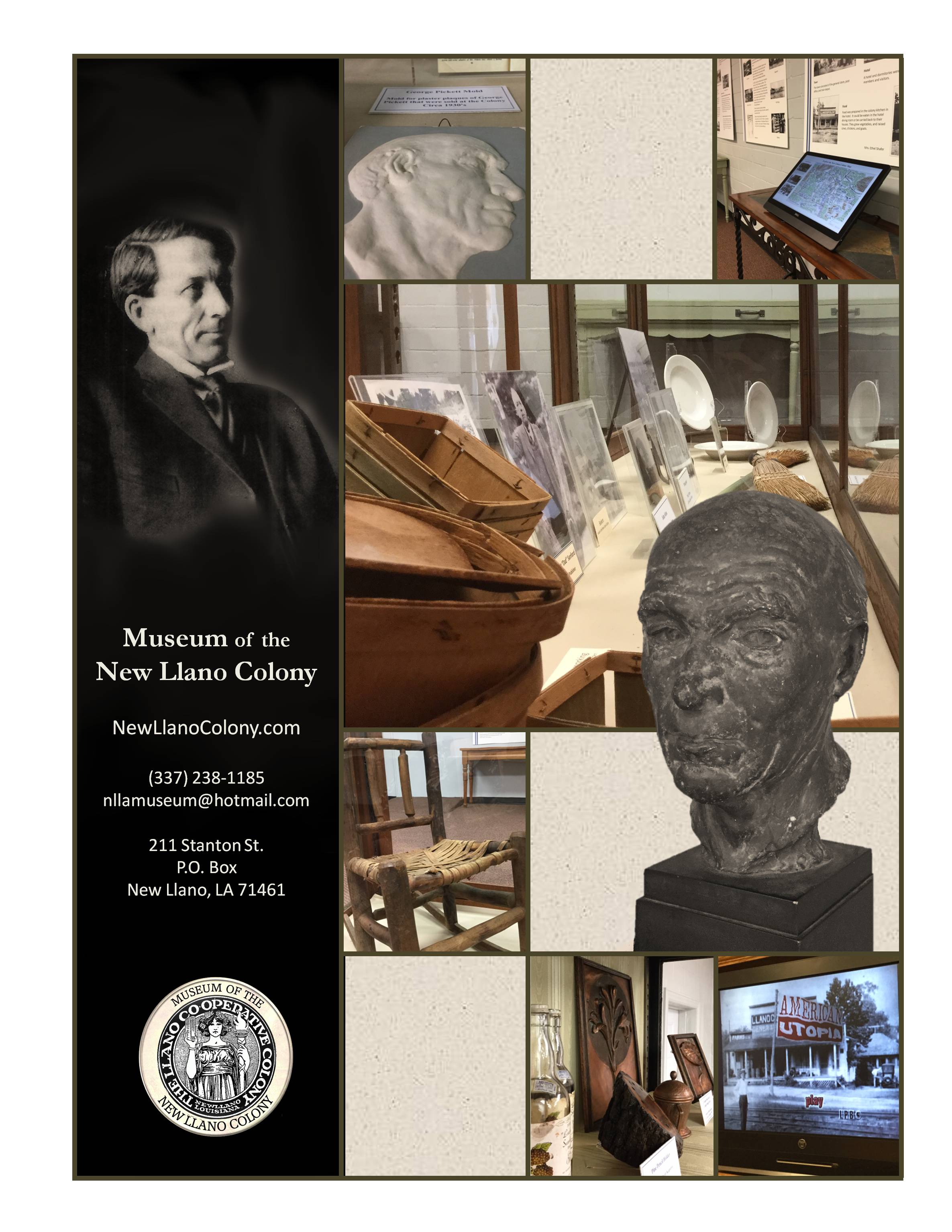
Museum of the New Llano Colony
The Llano Colony as I See It
Episode 1 -- Introduction to New Llano Colony and Socialism at the Time --- 1/13/2017
Celebrating the Colony's Move to Louisiana 100 Years Ago
The New Llano Co-Operative Colony was based on the general principal of equal opportunities for all members. First founded in 1914 near Los Angeles, California, it moved to the highlands of western Louisiana in 1917 and the utopian group soon established a variety of industries that enhanced the lives of, not only themselves, but also their new neighbors.
Colony propaganda encouraged a variety of social programs which, at the time, were absolutely unacceptable to big business, although today are considered standard. These included shorter work days, minimum wages, the end of child labor, equal rights for women, and worker's compensation.
All these ideas sprang from Socialist ideology of the time. Which is not surprising since the founder, Job Harriman was a Socialist politician, well-known around the country. I know that Socialism has had a pretty bad rap in recent years -- but it was an idea that appealed to many people at the time.
During the early 1900's, many people were leaving their farms, hoping to find paying jobs in the new factories that were springing up everywhere. Once they reached the cities however, they were usually forced by desperation to take whatever job was available. Long hours for little pay meant that workers were often barely able to scratch out a miserable existence. More often than not, EVERY member of the family had to work -- including the children -- just to get by, and sometimes the conditions were terrible and even dangerous.
And if you were unfortunate enough to be injured or get sick, there was little assistance to be had. You couldn't even count on the bosses to hold your job until you were well enough to return. Workers were so easily replaced that if you weren't able to work, they simply let you go.
Since few workers could afford medical care, many died at a young age, leaving their families to endure a very poor existence without them. There were no national or state funded assistance programs like we have today. The needy were dependent on the kindness of those around them -- and sometimes this was definitely lacking.
And yet, at the same time, there were some fortunate few who never worked, but only took the biggest share of the profits from the businesses where these sad laborers worked. These lucky people attended school, played in the parks, traveled for pleasure and saw all the new shows.
People could see how unfair this was, but what could they do? Some formed labor unions and held strikes, but strikes often led to violence. Others turned to Socialism as a more peaceful way to fight.
The Socialist party taught that people could establish a more equal condition of life for the whole community by removing the owners of the tools of production. They felt that if the GOVERNMENT owned all the tools and each and every man did his share of the work, then every member of the community would have all they needed -- not only enough for survival, but so much that everybody would be able to enjoy a rich, satisfying life.
It was at this point, in 1914, when Job Harriman founded the Llano del Rio Co-operative Colony near Los Angeles. Since the colony was based on these basic Socialist ideals, he hoped to show the world how well their beliefs could work. And it proved to be very popular -- within three years, colony membership had grown to almost 1,000 people living at the site and thousands more showing an interest in the venture.
Though they constantly struggled with financial problems and dissatisfied individuals, the New Llano colonists enjoyed freedom from tyrannical bosses. They owned the tools and produced what they needed for themselves. Their sick and elderly members enjoyed the same rights as the youngest and strongest colonist.
The Golden Rule, "Do unto others as you'd have them do unto you," became their doctrine and proved to be a very effective method for maintaining order. The Vernon Parish sheriff was quoted as stating that "if the whole Parish was as law-abiding as Llano colony he would be out of a job, as he never was called upon to arrest anyone there for law-breaking..."
Of course, as I'll explain in later podcasts, the colony eventually failed in 1937 and with the Cold War, McCarthyism, and dominance of the "Middle American" values, the socialist party virtually disappeared in the 1950's when membership fell below 2,000 members. But many of the ideas they worked for are still with us -- things like Social Security, low cost housing and welfare for the needy.
The Museum of the New Llano Colony is open Tuesday through Friday from 10am to 4pm. We'd love to have you stop by and hear more about this unique bit of Louisiana history.
Sources:
http://www.u-s-history.com/pages/h1669.html
The Socialist Ideal, by Paul Lafargue (1900)
https://www.marxists.org/archive/lafargue/1900/xx/ideal.htm
Socialism and the Worker
by Friedrich Adolph Sorge (1876)
https://www.marxists.org/archive/sorge/1876/socialism-worker.htm
Llano Colonist, February 25, 1928, Page 5
Copyright 2018 Museum of the New Llano Colony